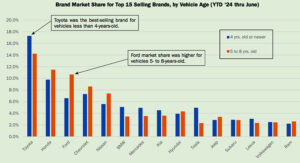Proponents of the law say automakers don’t want to service the entire fleet — their ‘end game’ is to control parts
Bethesda, Md.—It should be well known by now that car manufacturers need independent repairers and the automotive aftermarket to help maintain and service the nation’s vehicles in operation. Back-of-the-napkin simple math shows there simply aren’t enough dealership service and repair facilities to keep the entire driving public and fleets on the road alone. But why is there so much friction regarding access to mechanical repair data and pushback from OEMs on Right to Repair, which they are now challenging, again?
“It’s not to say that they don’t want any independents repairing cars,” Aaron Lowe, senior vice president of Regulatory and Government Affairs for the Auto Care Association, told Aftermarket Matters Weekly. “But they want to decide which independents are repairing the vehicles — and what parts they’re using. They make a lot of their money by selling parts, and if they control the repair market — who gets the information — then they can control the entire aftermarket supply chain from a parts perspective. That’s their end game.
“The entire aftermarket has a huge stake in this.”
Bill Hanvey, president and CEO of the Auto Care Association, said OEMs need the aftermarket, perhaps now more than ever with current supply chain issues. He noted that OEMs are having their own supply chain difficulties, and that they traditionally purchase about 20 percent of their parts from the aftermarket.
“We’ve heard now that those numbers are up to 30-35 percent, so that just reinforces the symbiotic relationship between the dealer, the local parts distributor and shops. It really works: the dealerships buy from the independent aftermarket, and the independent aftermarket buys from the dealerships.”
Lowe added, “Can you imagine how bad the supply chain issue would be right now if there wasn’t an independent aftermarket helping to make sure parts were available for repairs? Our industry continues to show how important it is to consumers and the entire transportation sector.”
Right to Repair — What is it and where does it go from here?
The Massachusetts Right to Repair Law Vehicle Data Access Requirement Initiative was on the ballot in November 2020 and was approved by 75 percent of voters. A previous Right to Repair law had been passed in 2012, but it exempted telematics systems from wireless accessibility by vehicle owners and independent repairers — the 2020 legislation changed that.
“If the car manufacturers have a telematics system on their vehicle that transmits data, then they have to allow the car owner to have that repair data and the ability to send it to an independent repair shop,” Lowe said. “The car owner controls the data, but it must only be diagnostic repair data.”
The “Yes” vote supported requiring manufacturers that sell vehicles with telematic systems in Massachusetts to equip them with a standardized open data platform. It was to begin with model year 2022 so that vehicle owners and independent repairers could access mechanical data and run diagnostics through a mobile-based application.
Under the new law, denial of access to mechanical data by a manufacturer would result in treble damages (which would award a plaintiff up to three times actual or compensatory damages) or $10,000 in compensation to a vehicle owner.
The passage of the Massachusetts legislation is connected to other types of Right to Repair laws, such as Apple just recently allowing for a more of an aftermarket for its devices. However, the Alliance for Automotive Innovation, which is a group representing General Motors, Toyota Motors, Volkswagen and other major automakers, filed suit in Massachusetts the same month after Right to Repair passed in 2020. The lawsuit argued that the law “makes personal driving data available to third parties with no safeguards to protect core vehicle functions and consumers’ private information or physical safety.” The Alliance maintained that Right to Repair conflicted with the Constitution and federal law.
“A judge was expected to issue a verdict last November,” Lowe said. “However, there was a Massachusetts petition to reopen the case because a Subaru car owner approached the state attorney general and said their telematics system had been disconnected. It turned out that all 2022 Subarus had their telematics systems turned off in Massachusetts.” Kia has now also disabled its telematics systems, he added.
In essence, the car manufacturers claimed they had to do it to comply with the state’s Right to Repair law, reasoning that if there were no telematics devices, then there was no data to transmit, therefore avoiding the law.
“There’s a new layer of complexity now because of this issue with Subaru (and now Kia),” Lowe explained. “We don’t know what’s going to happen. The car companies have been sitting on their hands and they’ve literally done nothing to try and comply — they just don’t want to. It’s unfortunate because we’ve reached out to them on multiple occasions about this issue to find a way to implement this law in a way that benefits consumers, who overwhelmingly want this to happen and our industry that wants to be competitive with repair data access.
“The judge has scheduled a hearing for next Wednesday (Feb. 2) to discuss the latest briefs. I am hopeful that this next hearing will provide us with a timeline for a verdict, but that is not certain.”
The Massachusetts legislature held a hearing on Jan. 10 to consider legislation being supported by the dealers to delay the compliance date from the 2022 model year to the 2025 model year and a bill that would transfer consumer disclosure requirements from the dealer to the manufacturers, Lowe said. “We opposed both bills and we do not anticipate any action by the legislature until the court case is settled.”
In the meantime, sponsors of Right to Repair are launching a federal effort with the legislation that will attempt to replicate the Massachusetts victory. Lowe allowed, however, that there remains a possibility there will be a state-by-state initiative. It remains to be seen.
“To win this effort on the national level will require a huge undertaking because the car companies are spending tons of money in Massachusetts to fight it and we anticipate they’ll do the same on the national level. We might not have the number of lawyers and lobbyists that they have, but we do have more people in this industry. And consumers are clearly on our side. We’re launching a big campaign to get people to contact their legislators.”
The Auto Care Association, Motor & Equipment Manufacturers Association (MEMA), Automotive Aftermarket Suppliers Association (AASA), Specialty Equipment Market Association (SEMA), Automotive Service Association (ASA) and others are all united in supporting the federal effort, Lowe said. “In all my decades in the industry, I can’t remember when we’ve all been brought together and united in order to get this done as one in Congress. We’re not stopping.”














Comments are closed.